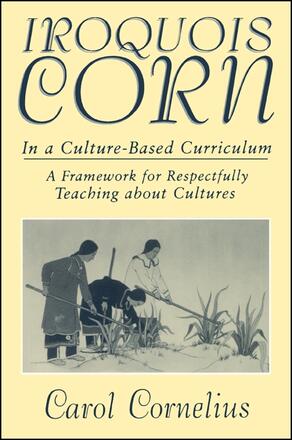
Iroquois Corn in a Culture-Based Curriculum
A Framework for Respectfully Teaching about Cultures
Alternative formats available from:
Provides a framework and an example for studying diverse cultures in a respectful manner, using the thematic focus of corn to examine the Haudenosaunee (Iroquois) culture.
Description
Carol Cornelius offers a new culture-based framework that provides a way to research and develop curricula based on respect of the diverse cultures of this nation. Using the Haudenosaunee culture as an example, Cornelius examines the source and reasons for the prevailing stereotypes about American Indians and explains how those stereotypes became the standard curriculum taught in America. She uses the components of world view and how it structures a way of life—the interaction of corn and culture, the dynamic aspect of Haudenosaunee culture, and the contemporary role of corn—to weave the interdependent, holistic, interdisciplinary framework for culture-based curriculum. Using this conceptual model, teachers can develop a culturally sensitive curriculum on any culture. The book therefore fills a void for teachers who want to utilize a multicultural approach in their classroom, but don't know how to begin the process.
Carol Cornelius, Oneida/Mahican, Ph. D. is Area Manager of the Oneida Cultural Heritage Department, Oneida Nation. She is the author of Six Nations Series and coauthor, with Jose Barreiro, of Knowledge of the Elders, The Iroquois Condolence Cane Tradition.
Reviews
"Using American schools to help citizens understand, respect, and value cultural diversity is extremely important. However, efforts in K-12 schools today to teach about 'other' cultures are a mile wide and an inch deep. That is to say everybody is doing it, but almost nobody is doing it with the honesty, legitimacy, and thoroughness that this task requires. This book faces this challenge, makes the arguments for thorough and honest exploration of one such culture, and demonstrates the rich information and insight to be gained from learning about the Haudenosaunee (Iroquois) culture. This topic is significant in itself, and significant in providing a better understanding of the demands of legitimate multicultural education. " — Joseph M. Larkin, California State University at Monterey Bay
"This book is the only fully-realized, conceptually-framed, and lyrically-phrased example of school curriculum that is based on Indian America's world view and resulting practices. The organizing metaphor of the 'Three Sisters' (corn, beans, and squash) captures the values of the Iroquois nation and presents the values with dignity and respect for a powerful tradition. " — Georgia Johnson, University of Idaho
"The topic of diversity and multiculturalism is becoming more and more important as a societal issue. Tolerance and understanding are imperative to the well being of all people and facets of society. The topic is timely, yet doesn't engage in guilt laden politics or blaming. " — George L. Cornell, Michigan State University